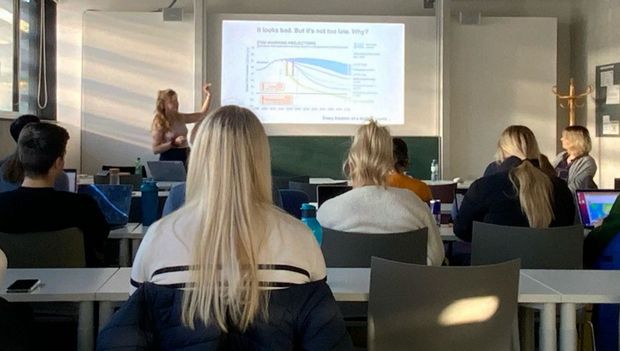The Volkshilfe has been a pivotal institution in Austria's socio-political landscape for decades, providing people with support during difficult times and in particularly vulnerable life circumstances. Faced with an ever more apparent increase in inequality as a result of the climate crisis, the Volkshilfe is now turning its attention to socio-ecological issues.

Sandra Prandstätter, project coordinator for sustainability and innovation at Volkshilfe Oberösterreich, is tasked with addressing social issues alongside ecological sustainability. As part of the course "Socio-Technical Transition Management", her presentation demonstrated just how important and complex her work at the crossroads of socio-ecological issues is.
Sandra Prandstätter opened her presentation by providing insight into Volkshilfe's core mission and history. The organization's roots can be traced back to a strong workers' movement that was committed to fighting poverty, promoting solidarity, and fostering social progress. Throughout the decades, the Volkshilfe has always strived to offer a variety of services and support programs to meet the diverse and changing needs of socio-economically disadvantaged population groups. A current example is the second-hand stores, created to provide economic opportunities and also promote sustainable consumerism. The Volkshilfe is also involved in supporting refugees, such as displaced Ukrainians, by providing resources and integrative programs.
Sandra Prandstätter then discussed the pressing need to address the climate crisis and underlined both the systemic and individual components of climate-friendly measures. Students also spoke about the extent to which they were concerned about the climate crisis, sparking an interesting discussion between all of the participants. The high percentage of international students in the course resulted in sharing perspectives from different geographical backgrounds.
In conclusion, Sandra Prandstätter presented Volkshilfe's plans to reduce its carbon footprint. One of the current objectives is to incorporate climate-friendly practices into all of its service programs and projects. Data collected in-house also revealed that transportation is one of the organization's biggest contributors to CO2 emissions. As a result, the Volkshilfe is now working to create a comprehensive transportation strategy that includes carpooling, alternative means of transportation, and electromobility.
The students and course instructor Dr. Laura Dobusch (Linz Institute for Transformative Change) acquired valuable insight on how social organizations can contribute significantly to addressing the climate crisis.
 Go to JKU Homepage
Go to JKU Homepage








